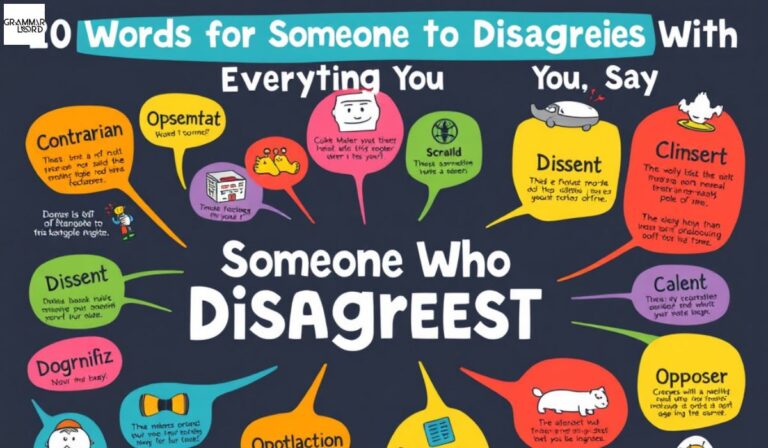Some people always seem to disagree with whatever you say. They argue, challenge, and contradict every statement. These individuals may have different reasons for their opposition.
Some do it to provoke, while others genuinely believe in their stance. Regardless of the reason, dealing with such people can be exhausting. Understanding their mindset can help manage conversations better.
his list provides words to describe these individuals. Each term highlights a unique way people express disagreement. Knowing these words can help you communicate more effectively.
Contrarian
A contrarian is someone who consistently takes an opposing stance. They often argue just to challenge the mainstream view.
Contrarians enjoy standing out by holding unconventional opinions. Their goal is not always to find the truth but to oppose the majority.
Cynic
A cynic is someone who doubts people’s intentions. They tend to believe that most actions are driven by selfish motives.
Cynics often dismiss positive viewpoints, seeing them as naive or insincere. They question kindness and good deeds as having hidden agendas.
Skeptic
A skeptic questions everything and rarely takes things at face value. They demand evidence before accepting any claim.
Skepticism can be useful in seeking the truth. However, excessive skepticism can make communication frustrating and unproductive.
Opposer
An opposer actively resists or argues against a statement or idea. They challenge views even if they lack strong reasoning.
Opposers may disagree due to personal bias rather than logical thinking. They often reject ideas simply because they differ from their own.
Naysayer
A naysayer constantly finds flaws in suggestions or plans. They often focus on the negatives instead of the positives.
Naysayers rarely support new ideas, preferring to criticize instead. Their negativity can hinder progress and discourage innovation.
Dissenter
A dissenter is someone who refuses to agree with commonly accepted beliefs. They voice their disagreement openly.
Dissenters play a crucial role in challenging societal norms. However, excessive dissent without solutions can create unnecessary conflict.
Devil’s Advocate
A devil’s advocate argues for the sake of debate. They may not even believe in the viewpoint they defend.
This approach can be useful for testing arguments. However, it can also frustrate those seeking genuine discussions.
Rebutter
A rebutter specializes in refuting arguments. They consistently provide counterpoints to any statement made.
Rebutters are often skilled debaters who enjoy intellectual challenges. However, their need to argue can make conversations exhausting.
Antagonist
An antagonist is someone who actively works against others. They create conflict and opposition in various situations.
Antagonists thrive on disputes, often making discussions more confrontational. Their presence can make teamwork difficult.
Contradictor
A contradictor frequently disputes statements, even minor ones. They habitually take the opposite stance.
This behavior can frustrate people trying to have a normal conversation. Contradictors often argue without considering the impact on relationships.
Disputer
A disputer loves engaging in arguments, no matter the topic. They feel compelled to challenge others’ opinions.
While disputes can be constructive, constant disagreement can create tension. Disputers can come across as confrontational.
Gainsayer
A gainsayer habitually denies or contradicts statements. They instinctively reject others’ views.
Gainsayers may refuse to accept facts or well-supported arguments. Their automatic opposition can be irrational and frustrating.
Iconoclast
An iconoclast challenges traditions and established beliefs. They often seek to change the status quo.
While iconoclasts can inspire progress, they may also reject valuable traditions. Their rebellious nature can create friction.
Revisionist
A revisionist challenges existing ideas and rewrites narratives. They reexamine history, laws, or facts.
Revisionists often provide fresh perspectives, but excessive revisionism can distort reality. Their views may be controversial.
Recalcitrant
A recalcitrant person resists authority and refuses to follow rules. They oppose control and challenge regulations.
Recalcitrance can be useful in fighting injustice. However, excessive resistance can lead to unnecessary conflict.
Defiant
A defiant person openly resists authority or opposition. They refuse to conform to expectations.
Defiance can be a sign of strength, but it can also lead to unnecessary hostility. Defiant individuals may struggle with teamwork.
Provocateur
A provocateur stirs up controversy and encourages opposition. They deliberately provoke arguments.
Provocateurs thrive on chaos and tension. Their actions can fuel disagreements and disrupt harmony.
Maverick
A maverick is independent-minded and refuses to follow conventions. They challenge the norm with unique perspectives.
While mavericks drive innovation, they may also alienate others. Their unwillingness to conform can create conflicts.
Obstructionist
An obstructionist deliberately hinders progress. They oppose ideas without providing alternatives.
Obstructionists slow down discussions and decision-making. Their resistance often leads to frustration in teams and organizations.
Pessimist
A pessimist sees the negative side of everything. They often disagree because they expect failure.
Pessimism can prevent unrealistic expectations, but constant negativity can drain others’ energy. Pessimists may struggle with optimism and teamwork.
Frequently Asked Questions
What is the difference between a contrarian and a skeptic?
A contrarian disagrees for the sake of opposition, while a skeptic questions ideas but is open to proof.
Is being a devil’s advocate always a bad thing?
No, playing devil’s advocate can help explore different perspectives, but overuse can frustrate people.
How do you deal with someone who constantly disagrees with you?
Stay calm, ask for reasoning, and avoid unnecessary arguments. Sometimes, agreeing to disagree is best.
Are dissenters necessary for progress?
Yes, dissenters challenge the status quo and promote change, but balance is needed to avoid conflict.
Can pessimism be beneficial?
In some cases, yes. A pessimistic outlook can prepare for challenges, but excessive negativity can be draining.
Conclusion
Disagreements are part of human nature, and different personalities contribute to them. While some disagreement can be productive, excessive opposition can create unnecessary friction.
Understanding these personality types helps in managing interactions effectively. Whether dealing with a contrarian, skeptic, or naysayer, the key is to maintain open-minded discussions while avoiding unnecessary conflicts.

